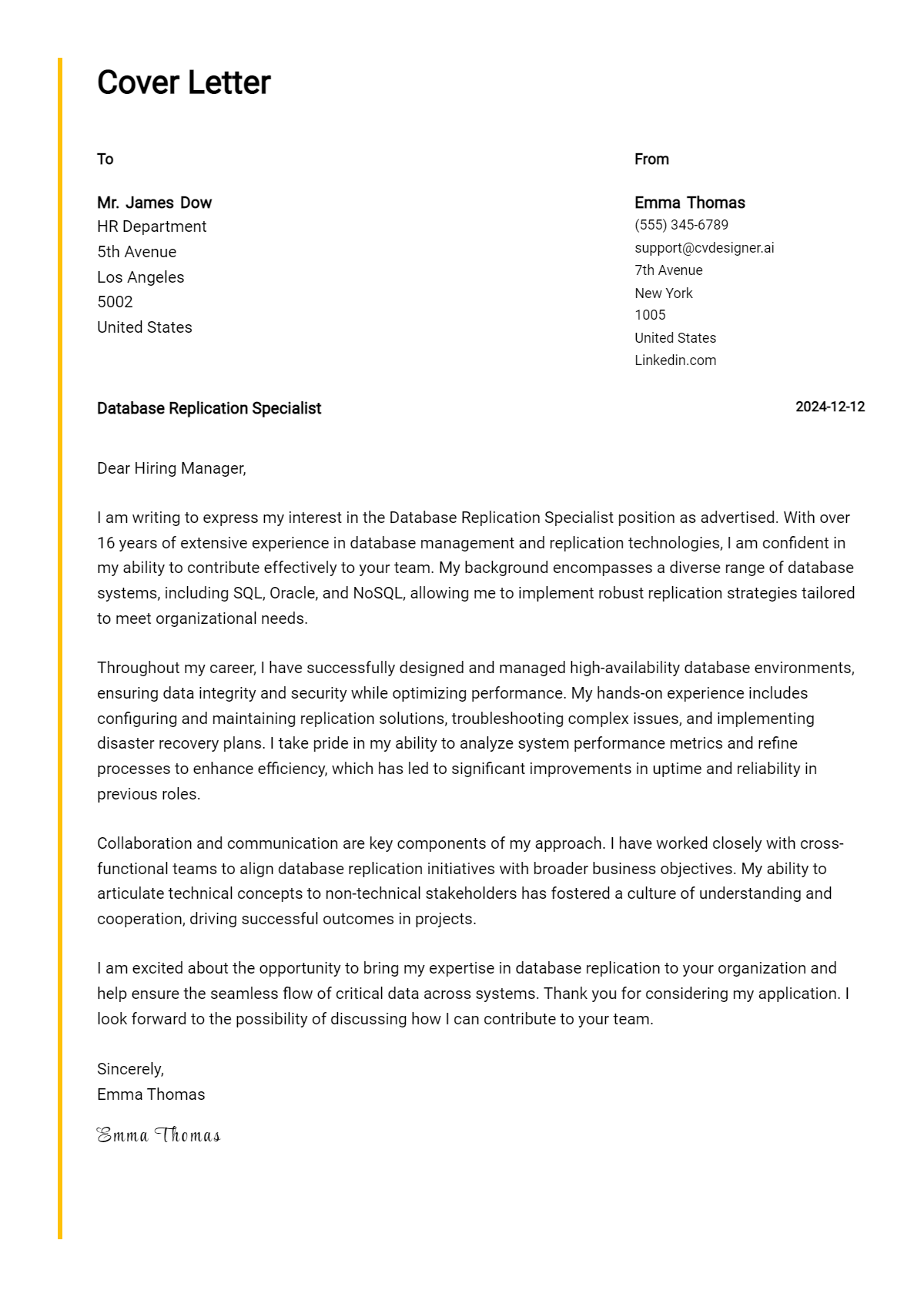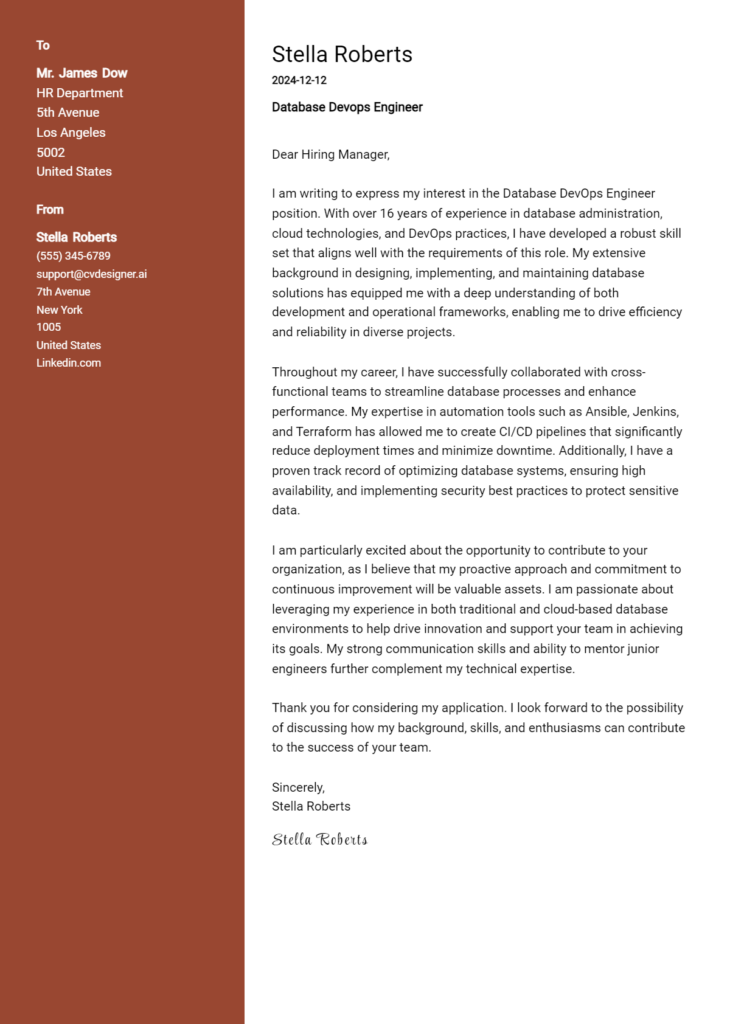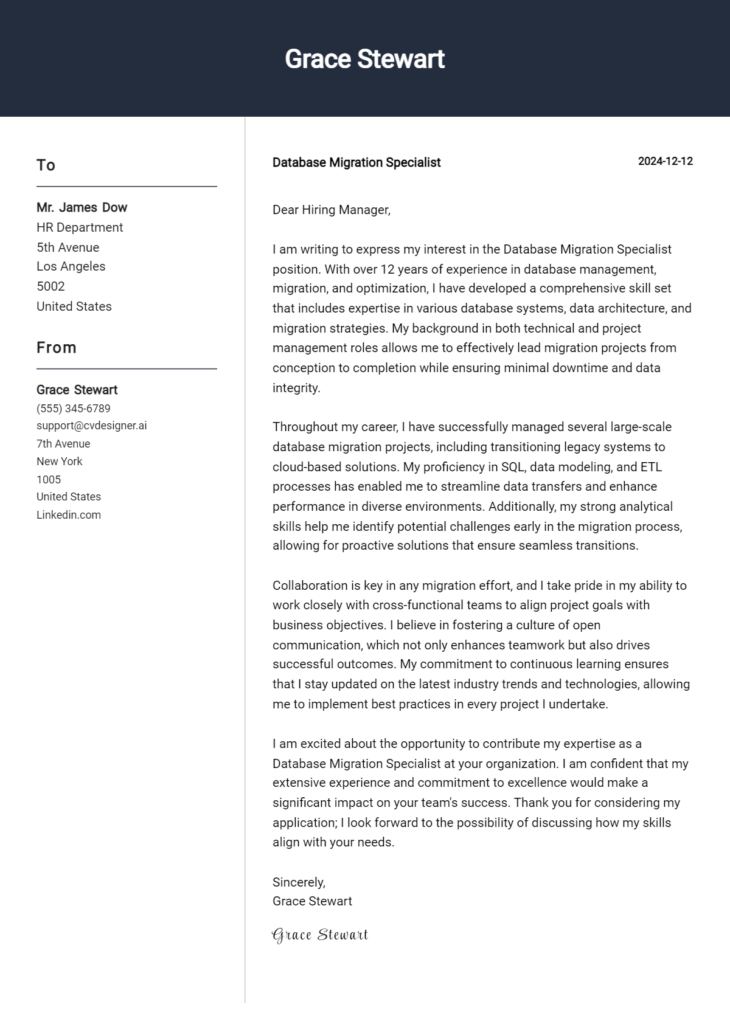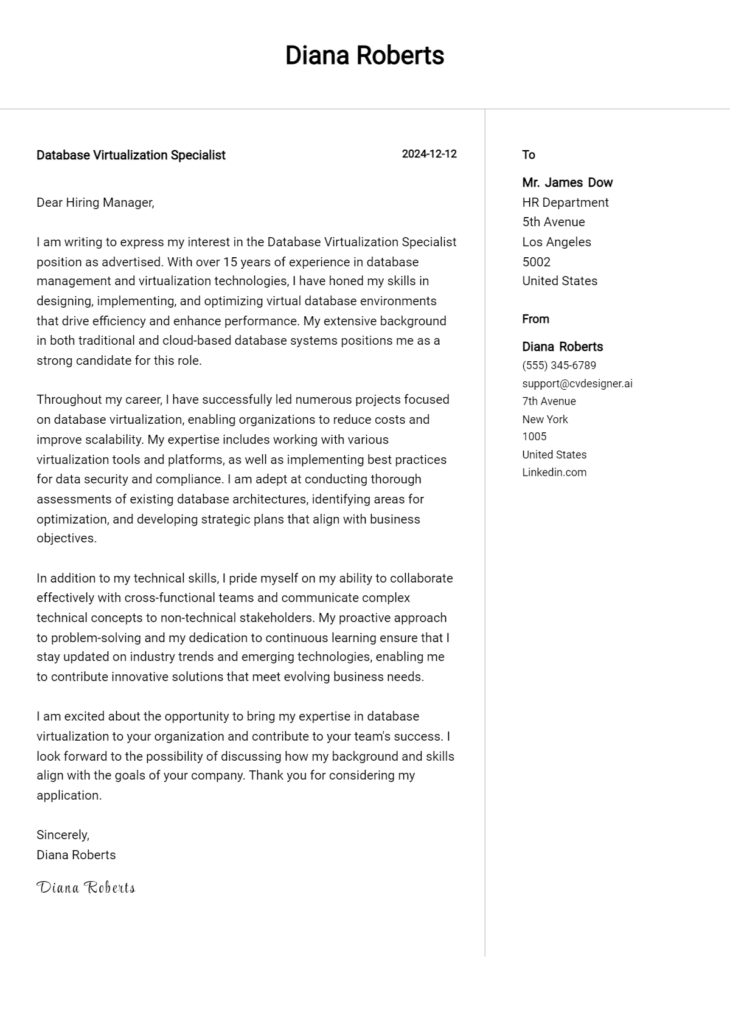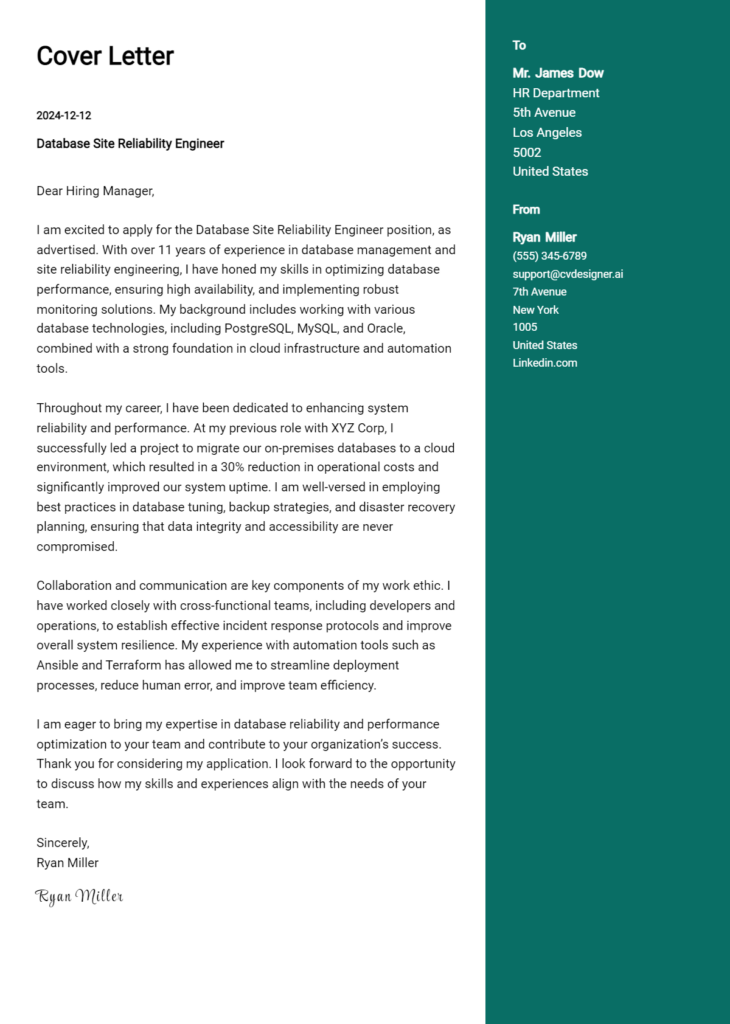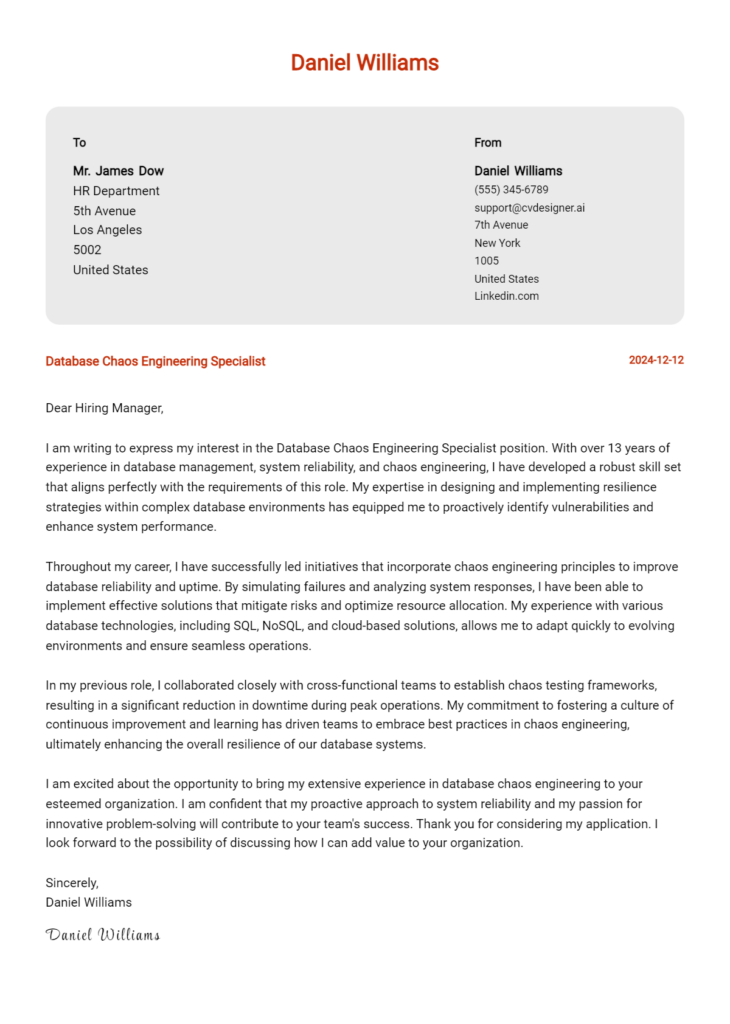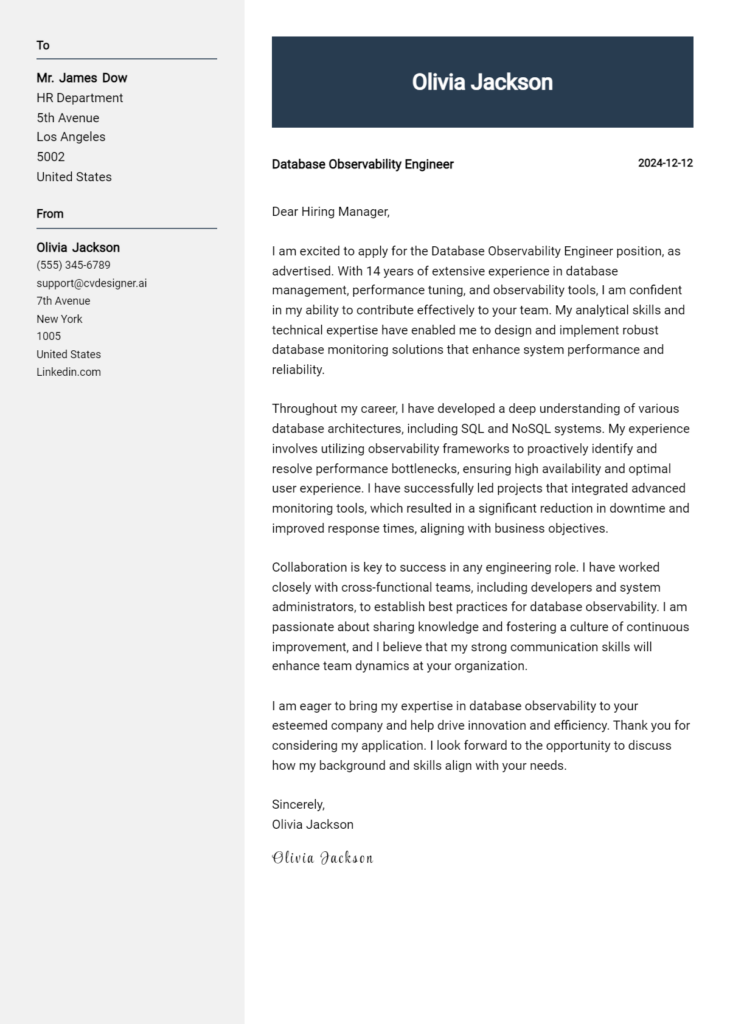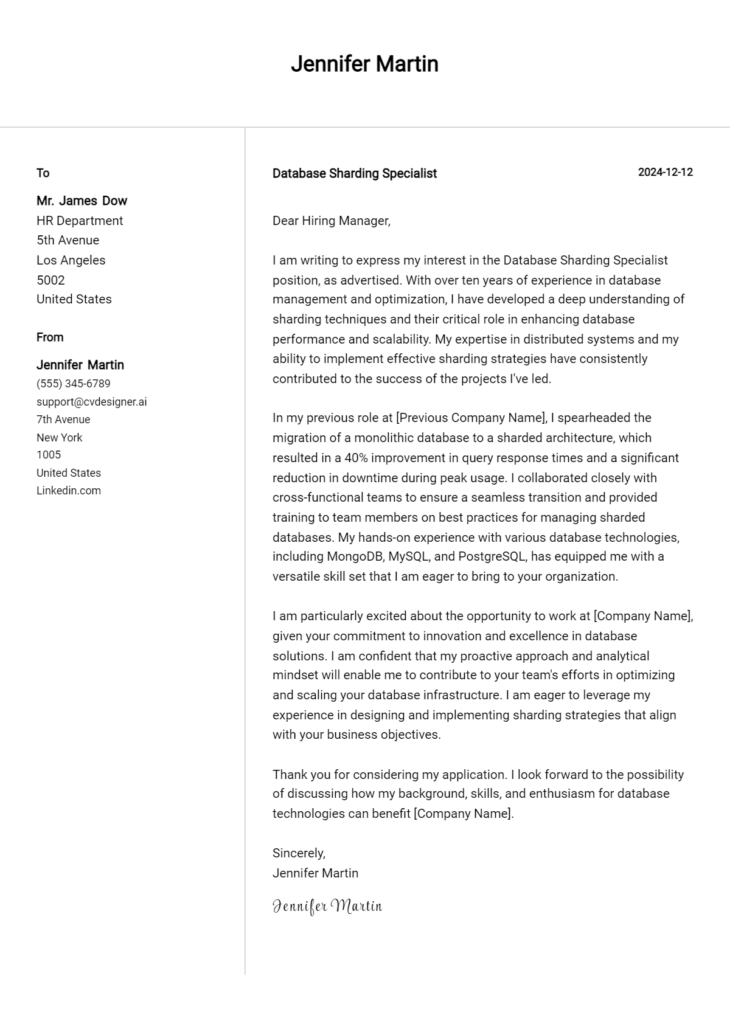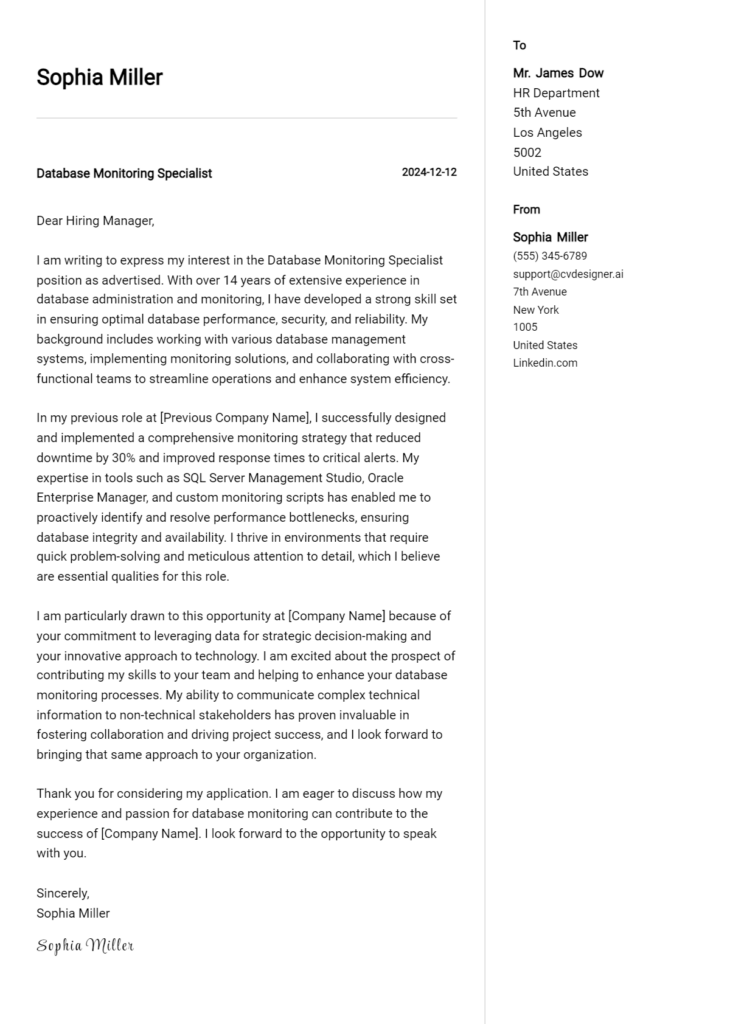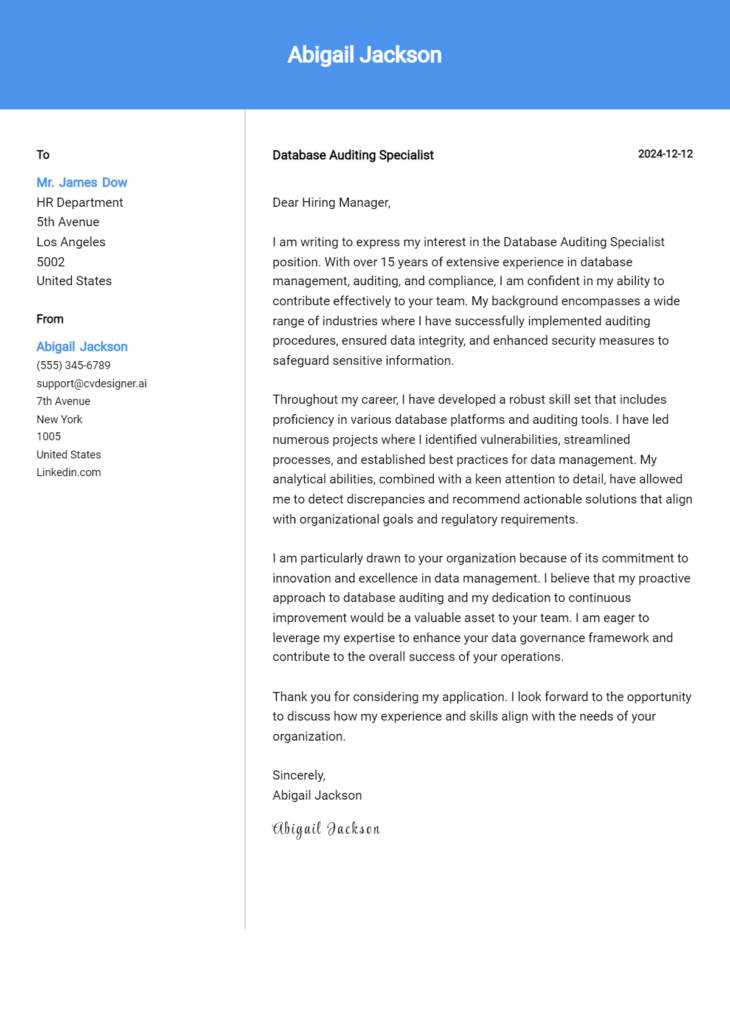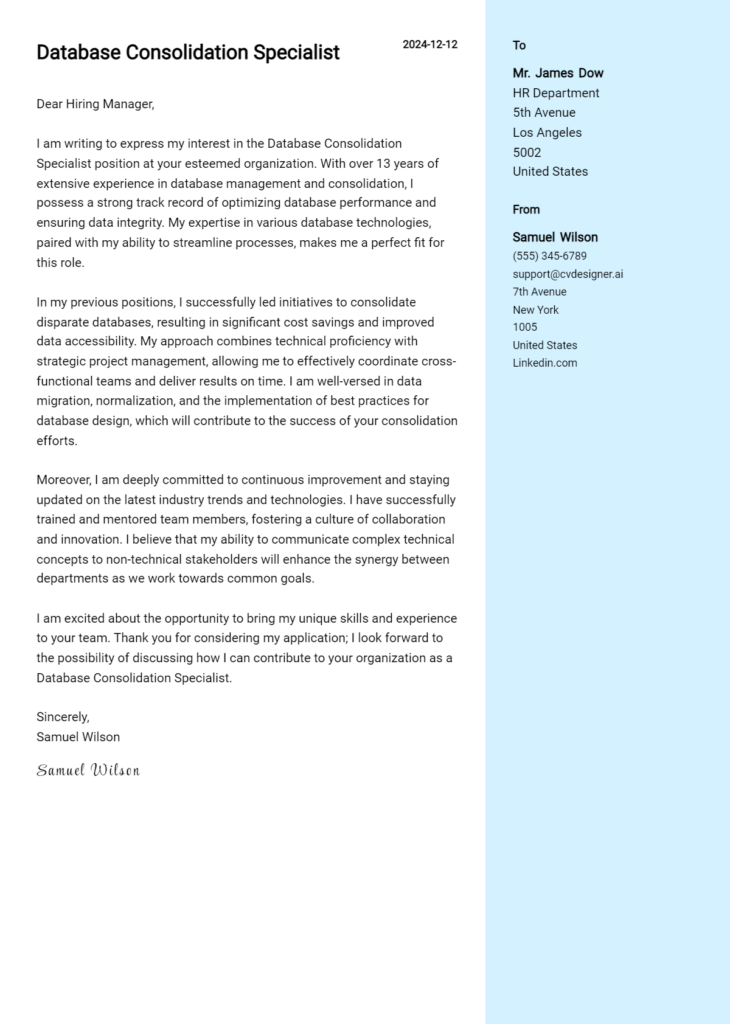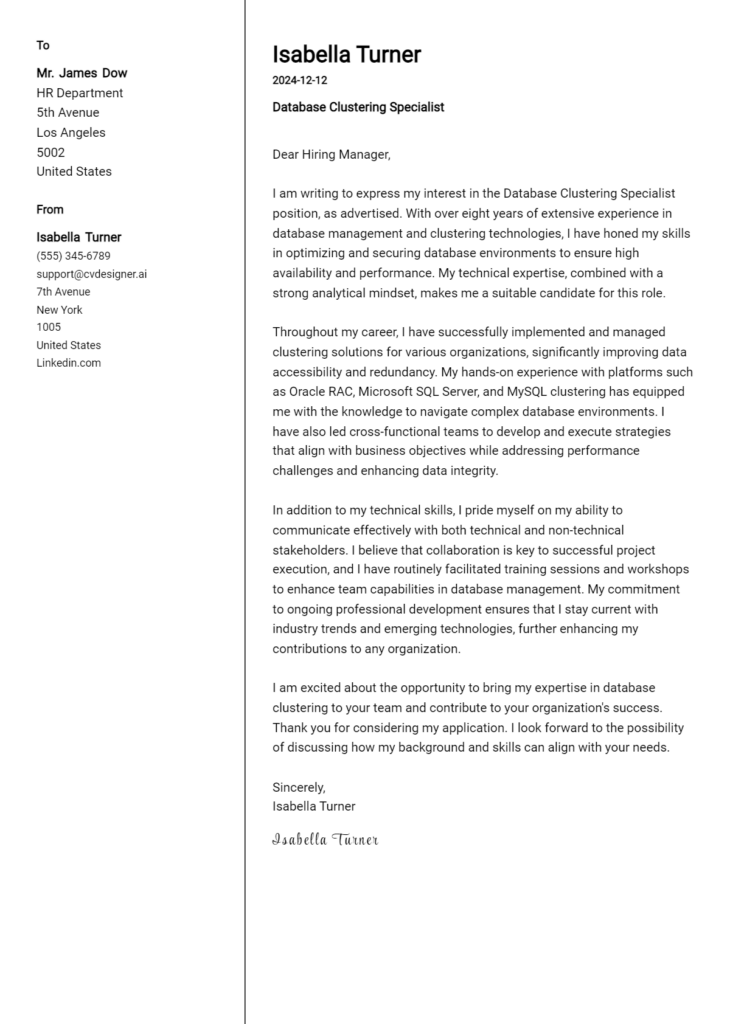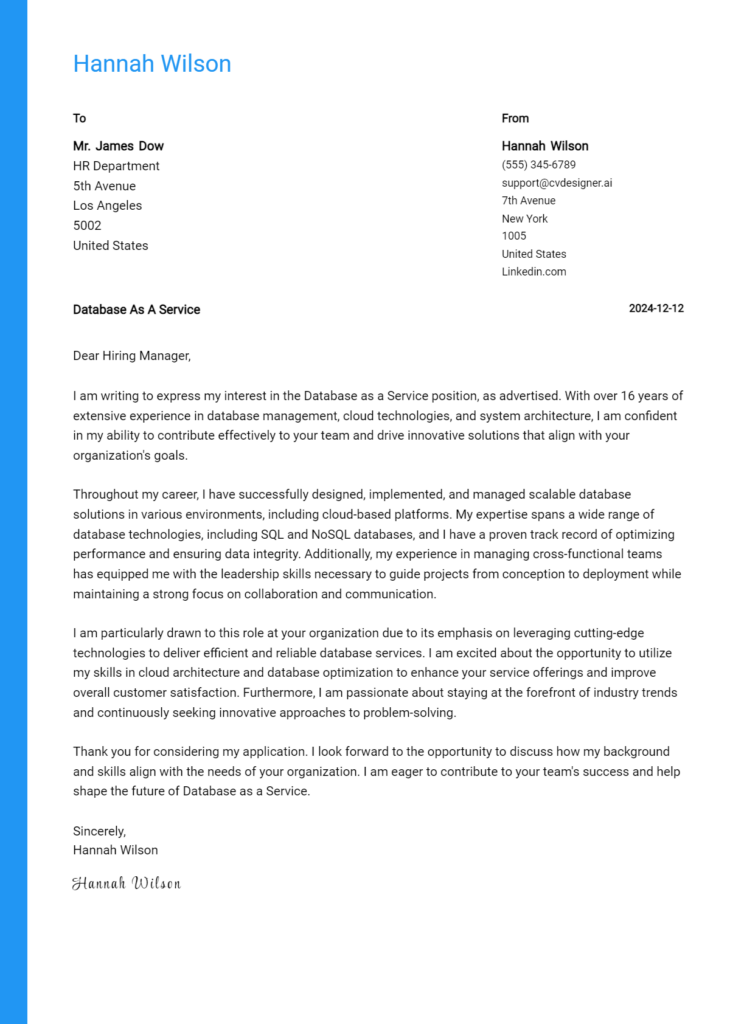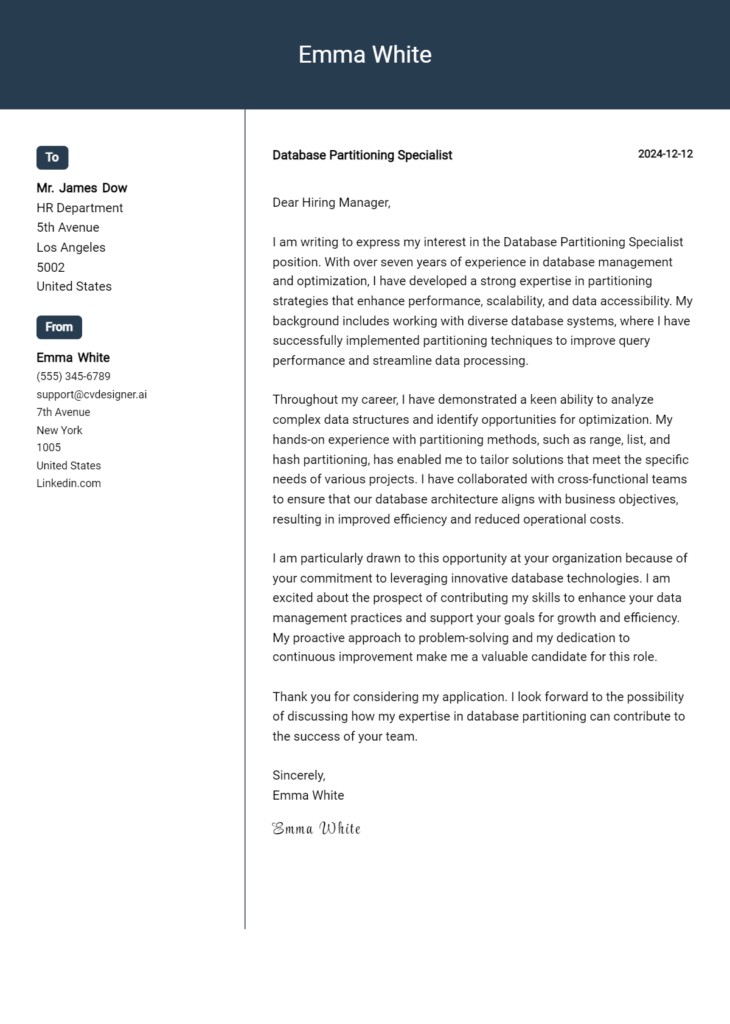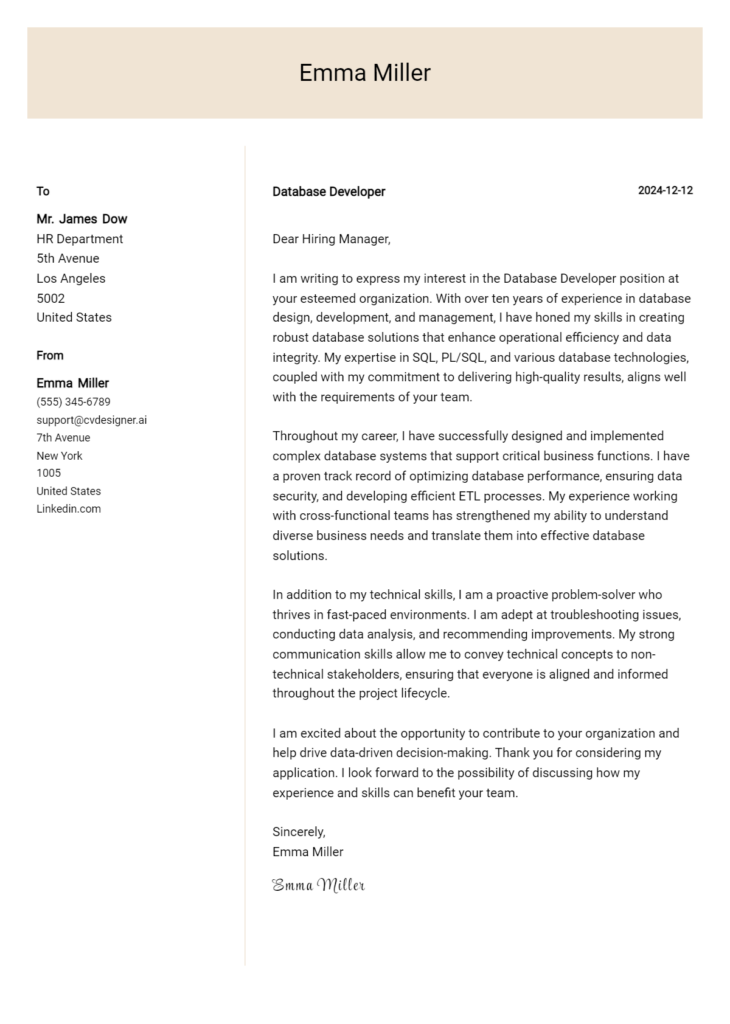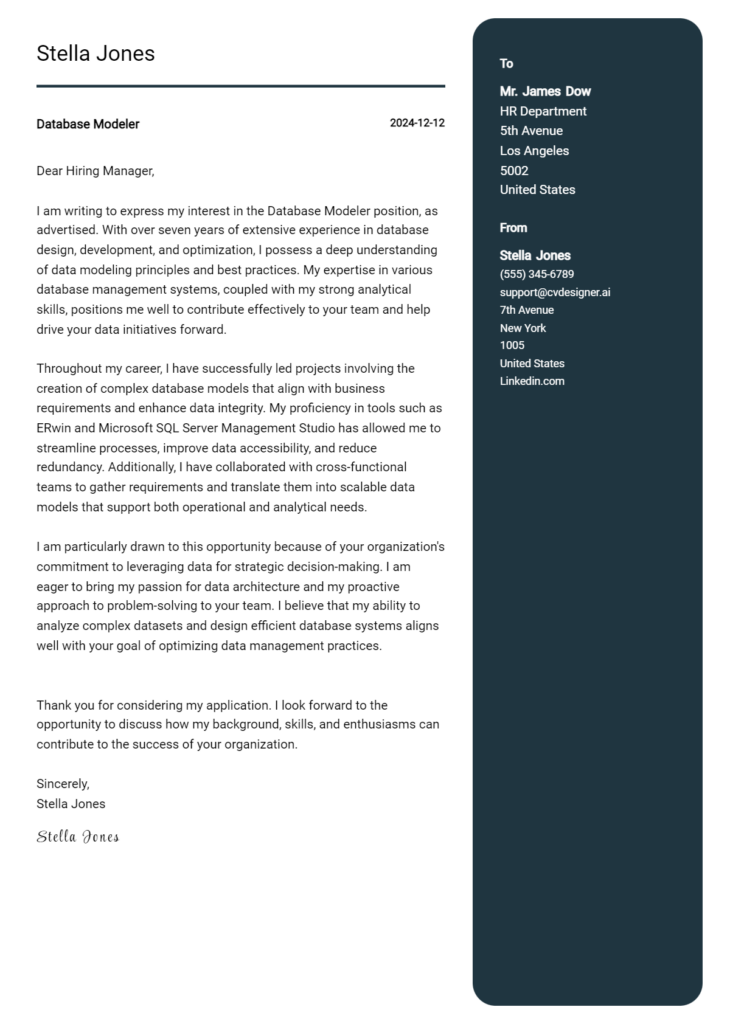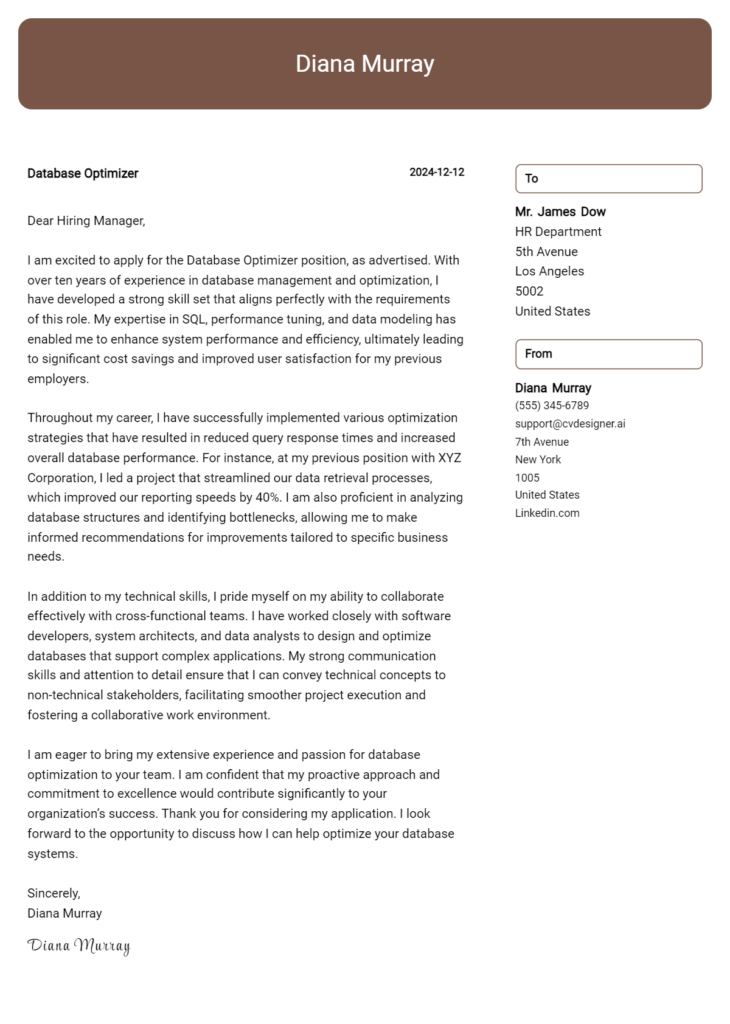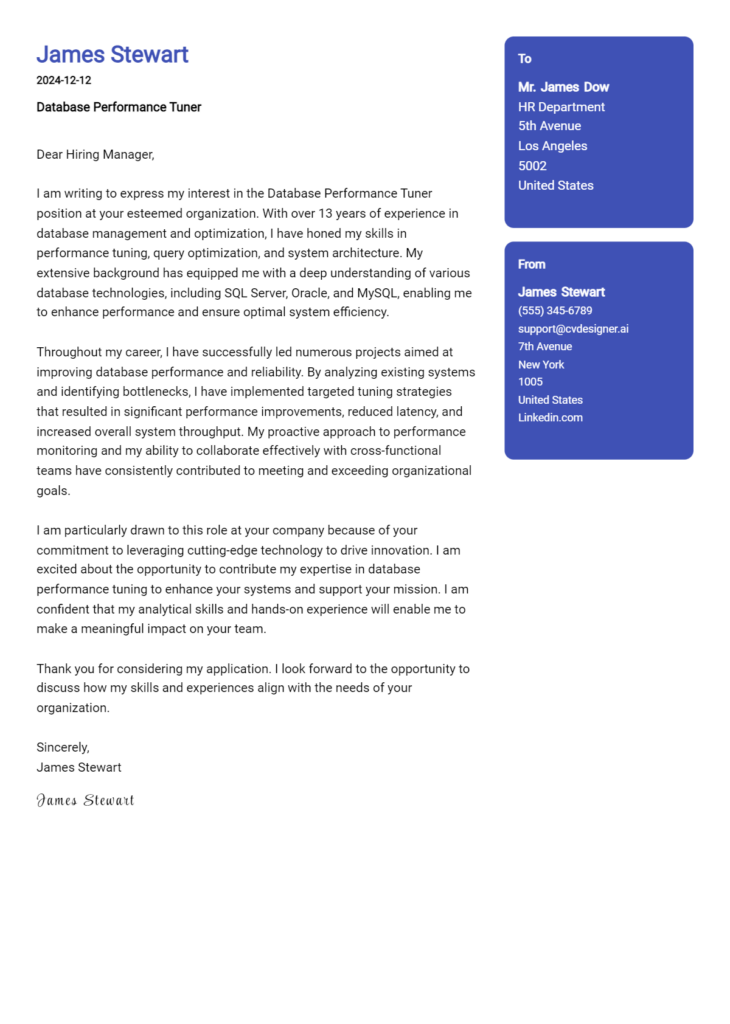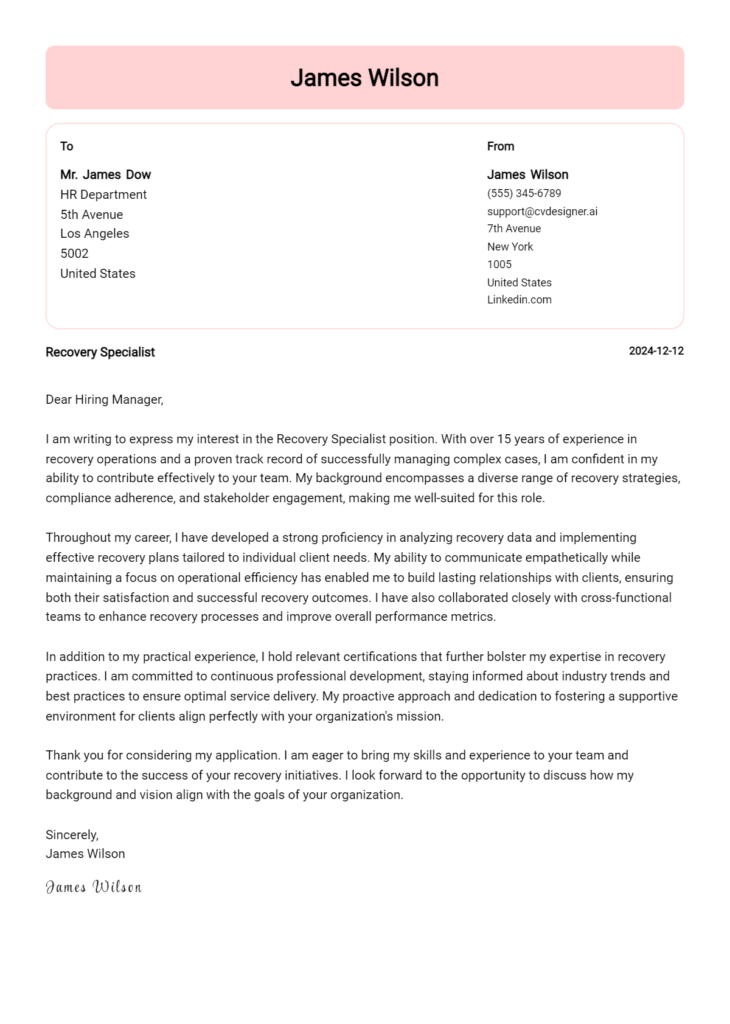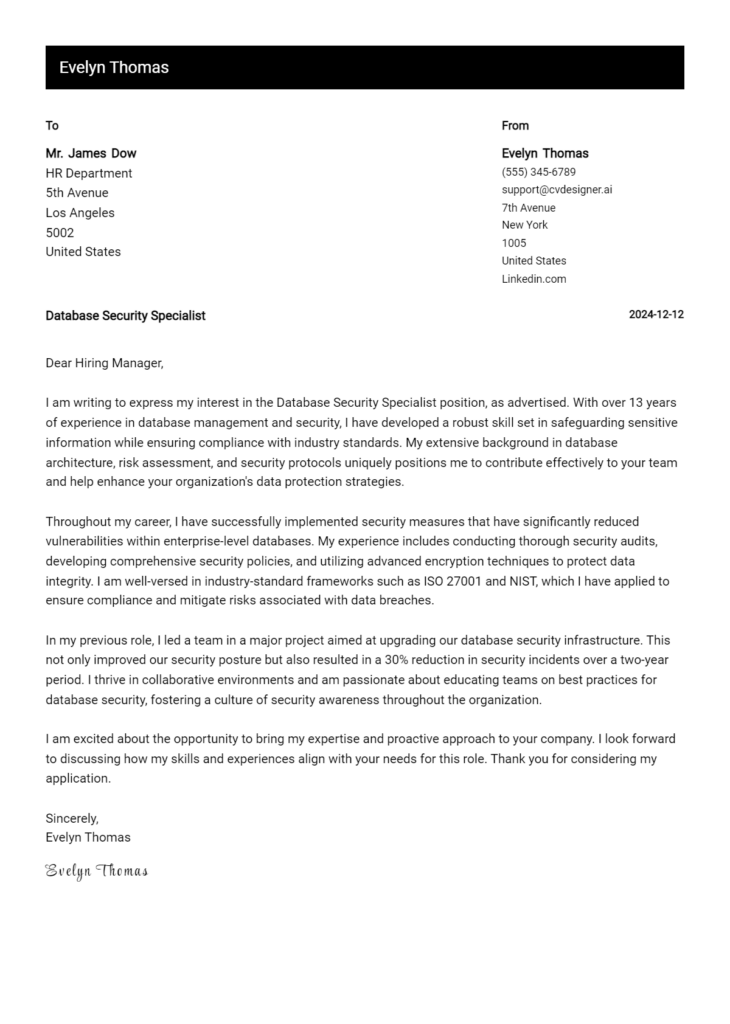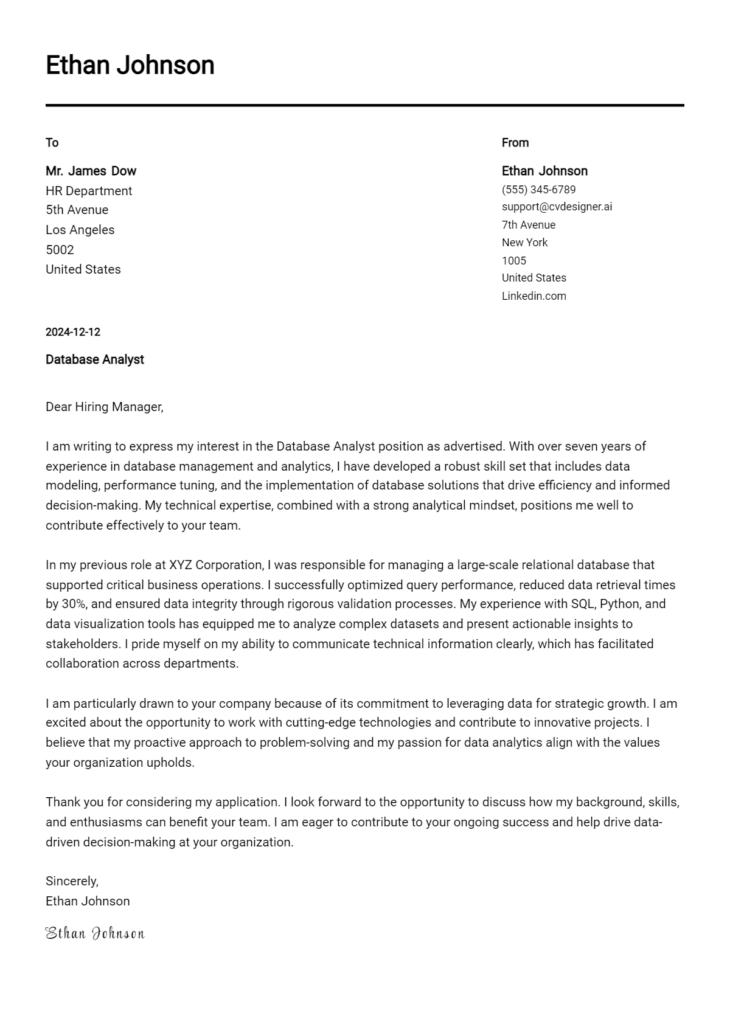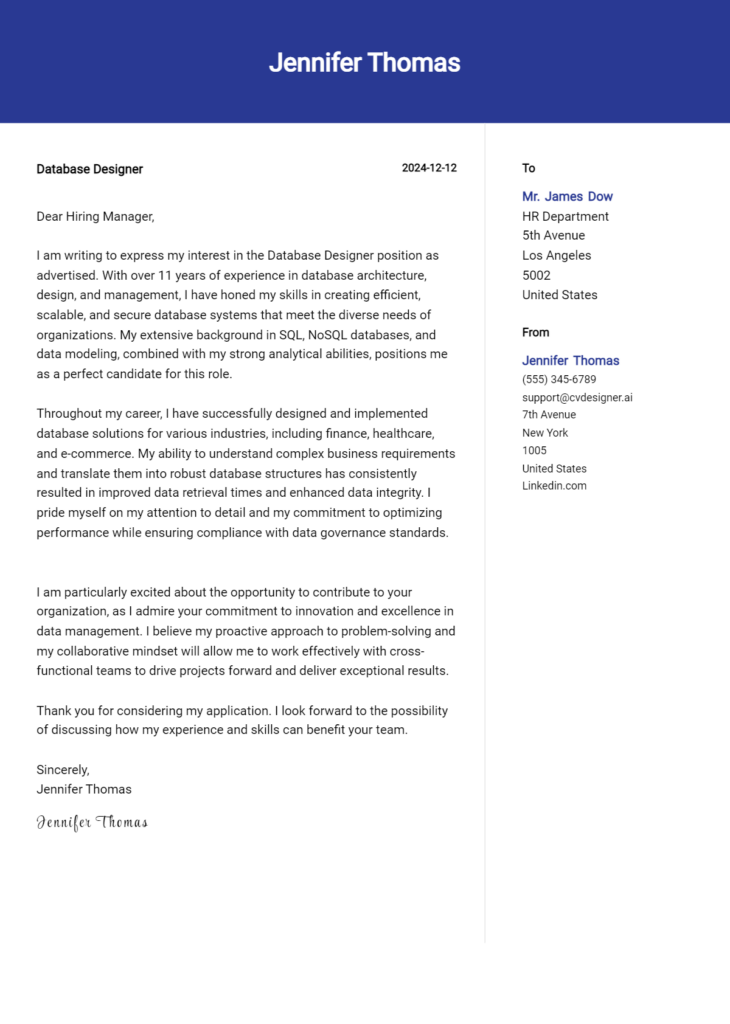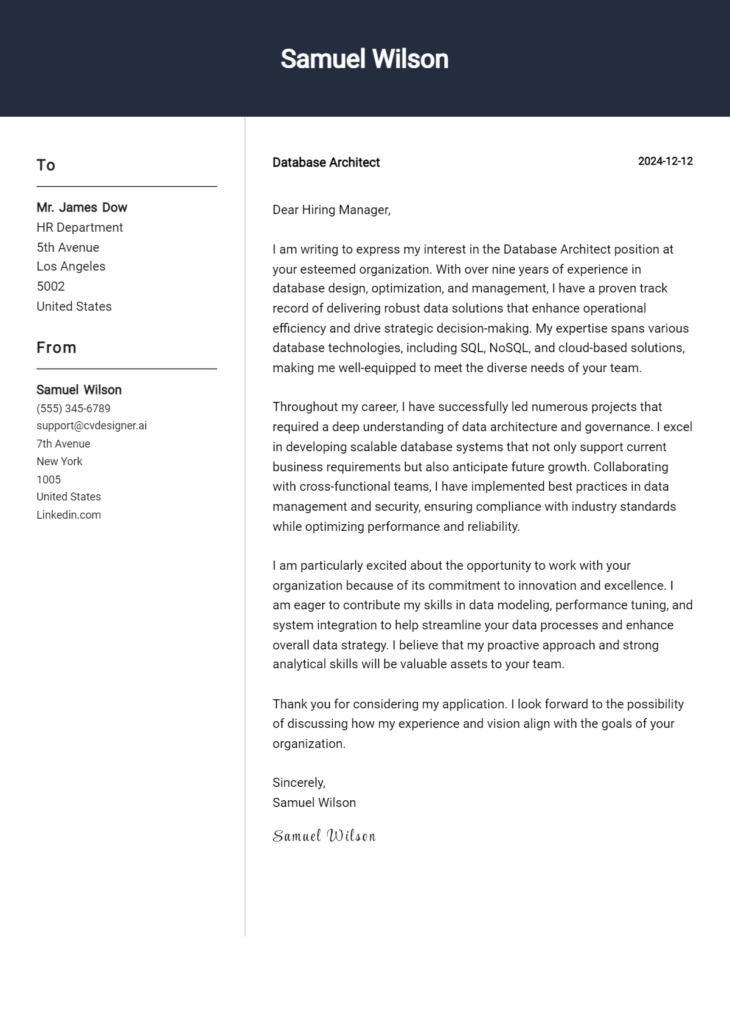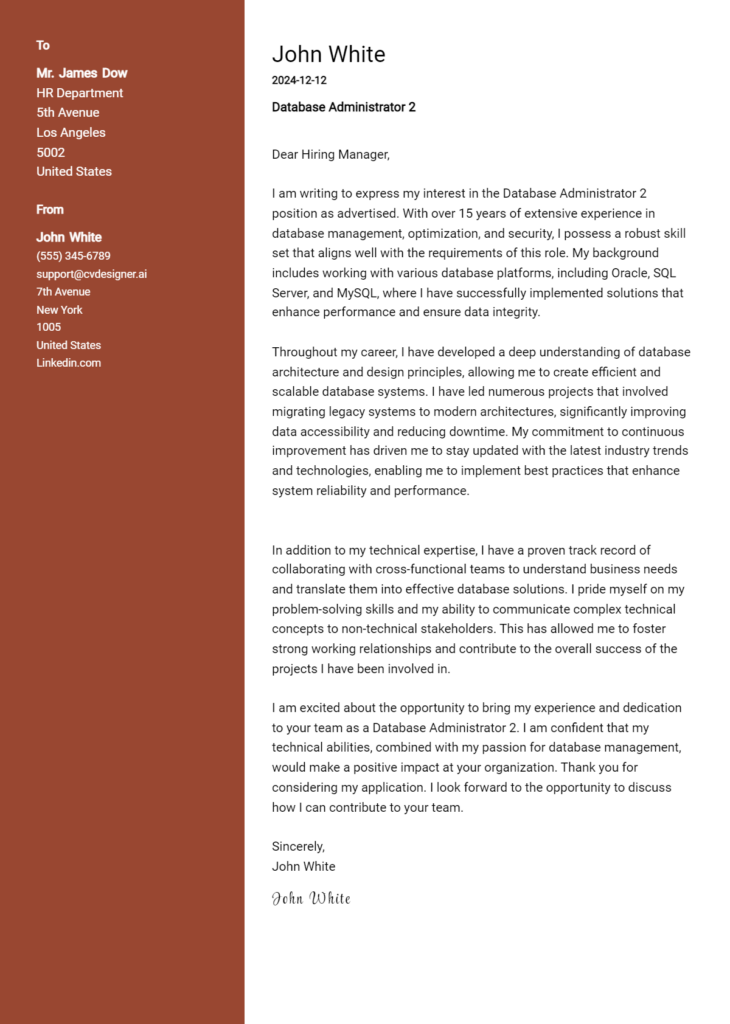Database Replication Specialist Cover Letter Examples
Explore additional Database Replication Specialist cover letter samples and guides and see what works for your level of experience or role.
How to Format a Database Replication Specialist Cover Letter?
Crafting an effective cover letter is essential for a Database Replication Specialist, as it not only showcases your technical skills but also reflects your ability to manage data integrity, synchronization, and system performance. The way you format your cover letter can significantly influence the hiring manager's perception of your professionalism and attention to detail—qualities highly valued in database management.
In this guide, we will outline how to structure your cover letter, providing insights and specific examples tailored for a Database Replication Specialist.
We will focus on the crucial components of a professional cover letter, including:
- Cover Letter Header
- Cover Letter Greeting
- Cover Letter Introduction
- Cover Letter Body
- Cover Letter Closing
Each section is vital in demonstrating your qualifications and commitment to excellence. Let’s delve into each component to help you create a standout cover letter that speaks directly to your expertise in database replication.
Importance of the Cover Letter Header for a Database Replication Specialist
The cover letter header is a crucial element of your job application as a Database Replication Specialist. It serves as the first impression you make on potential employers and sets the tone for the rest of your letter. A well-structured header includes essential information such as your contact details, the date, and the recipient's information. This clarity not only facilitates easy communication but also reflects professionalism, which is vital in technical roles like database replication where precision and attention to detail are paramount.
A strong header will convey your information clearly, making it easy for hiring managers to see who you are and how to reach you. Conversely, a weak header may create confusion or come off as unprofessional, potentially jeopardizing your application.
Strong Example
Jane Doe 123 Database Lane Data City, DC 12345 jane.doe@email.com (123) 456-7890 October 10, 2023 Mr. John Smith Hiring Manager Tech Solutions Inc. 456 Innovation Blvd Tech Town, TC 67890
Weak Example
Jane jane@email.com 10/10/23 To Whom It May Concern
The Importance of a Strong Cover Letter Greeting
The greeting of your cover letter serves as the initial point of contact with the hiring manager, setting the tone for the rest of your application. A well-crafted greeting not only demonstrates your professionalism but also adds a personal touch by addressing the recipient directly. This approach shows that you have taken the time to research the company and the individual, making your application stand out in a competitive job market. To create an effective greeting, avoid generic salutations like "To Whom It May Concern" and instead, strive to find the hiring manager's name through LinkedIn or the company website. This small effort can significantly enhance the impact of your cover letter.
Strong Greeting Example
Dear Ms. Johnson,
Weak Greeting Example
To Whom It May Concern,
The Importance of a Compelling Cover Letter Introduction for a Database Replication Specialist
A well-crafted cover letter introduction is crucial for a Database Replication Specialist, as it sets the tone for the entire application and can significantly influence the hiring manager’s first impression. This introduction should capture the reader's attention, express the candidate's genuine interest in the role, and briefly showcase relevant skills or achievements that align with the job requirements. A strong introduction not only piques curiosity but also establishes the candidate's qualifications, making it an essential component of a successful job application.
Strong Example:
Dear [Hiring Manager's Name], As a passionate Database Replication Specialist with over five years of hands-on experience in designing and implementing robust replication strategies, I am excited to apply for the position at [Company Name]. My proven track record of enhancing database performance and ensuring seamless data synchronization has not only improved system reliability but also reduced downtime by 30%. I am eager to bring my technical expertise and innovative problem-solving skills to your dynamic team.
Weak Example:
Hello, I am writing to apply for the Database Replication Specialist position. I have done some database work before and think I could be a good fit. I like working with data and hope to get the job.
Purpose of the Cover Letter Body for a Database Replication Specialist
The cover letter body for a Database Replication Specialist serves as a critical tool for showcasing the candidate's technical skills, relevant experiences, and overall value to the potential employer. This section allows applicants to highlight their expertise in database technologies, data integrity, and replication strategies, while also detailing specific projects or accomplishments that demonstrate their capabilities. By providing tangible examples, such as successful implementations of replication systems or optimizations that led to improved performance, the candidate can effectively illustrate how their background aligns with the company's needs and goals.
Strong Example
Dear [Hiring Manager's Name], I am excited to apply for the Database Replication Specialist position at [Company Name]. In my previous role at [Previous Company Name], I successfully led a project to implement a multi-region database replication strategy that improved data availability and reduced downtime by 40%. By utilizing technologies like MySQL and PostgreSQL, I was able to design a solution that not only met our business continuity requirements but also enhanced system performance by optimizing replication lag. My hands-on experience with various replication techniques, coupled with my ability to troubleshoot complex database issues, positions me as a strong candidate who can contribute significantly to [Company Name]'s data management initiatives.
Weak Example
Dear [Hiring Manager's Name], I am writing to express my interest in the Database Replication Specialist position at [Company Name]. I have worked with databases in the past and I think I would be a good fit for the role. I know how to replicate data and have read about various techniques. I am eager to learn more and think that I could help your company with its database needs.
Importance of the Cover Letter Closing for a Database Replication Specialist
The closing paragraph of a cover letter is crucial as it serves to summarize your qualifications, reiterate your enthusiasm for the position, and encourage the employer to take the next steps, such as reviewing your resume or scheduling an interview. A strong closing can leave a lasting impression and reinforce your fit for the role, while a weak one may fail to convey your eagerness and professionalism.
Strong Example
Thank you for considering my application for the Database Replication Specialist position. With my extensive experience in database management and replication technologies, I am excited about the opportunity to contribute to your team. I am confident that my technical skills and dedication to ensuring data integrity align well with your company's goals. I look forward to the possibility of discussing my application in more detail and hope to schedule an interview soon. Please feel free to contact me at your convenience.
Weak Example
Thanks for looking at my letter. I think I would be okay at this job. You can call me if you want to talk more about it.
These tips will assist candidates in crafting an effective cover letter for a Database Replication Specialist position. A strong cover letter should not only highlight your technical skills but also demonstrate your problem-solving abilities, familiarity with the Software Development Life Cycle (SDLC), capacity for teamwork, and a commitment to continuous learning. By effectively communicating these aspects, you can make a compelling case for your candidacy.
Cover Letter Writing Tips for Database Replication Specialist
Highlight Technical Skills: Begin your cover letter by showcasing your technical expertise in database replication technologies and tools. Mention specific platforms you have experience with, such as Oracle GoldenGate, Microsoft SQL Server Replication, or MySQL. This sets a solid foundation for your qualifications and demonstrates your capability to handle complex database environments.
Emphasize Problem-Solving Abilities: Use specific examples to illustrate your problem-solving skills. Describe situations where you identified replication issues and implemented solutions. For instance, you might discuss how you optimized replication performance in a high-availability scenario. This not only highlights your technical prowess but also your analytical thinking.
Showcase SDLC Knowledge: Include your understanding of the Software Development Life Cycle in your cover letter. Explain how your role in database replication fits into the broader context of software development and deployment. This shows that you are not just a database specialist but a team player who understands how your work impacts the entire project lifecycle.
Demonstrate Teamwork: Discuss your experience working in collaborative environments. Highlight projects where you successfully partnered with developers, system administrators, or other stakeholders to ensure seamless database replication. Illustrating your ability to work in a team reinforces your communication skills and adaptability.
Express Passion for Continuous Learning: In today's fast-paced tech world, continuous learning is vital. Mention any recent certifications, courses, or self-study efforts you've undertaken to stay updated with the latest database technologies and replication strategies. This shows potential employers that you are proactive about your professional development and are committed to excellence in your field.
For more assistance in crafting your cover letter, consider using cover letter templates or a cover letter builder. These resources can help streamline the writing process and ensure you present your qualifications in the best light.
Common Mistakes to Avoid in a Database Replication Specialist Cover Letter
Crafting a compelling cover letter is essential for standing out as a Database Replication Specialist. Avoiding common mistakes can significantly enhance your chances of making a positive impression. Here are some pitfalls to steer clear of:
- Generic Greetings: Using "To Whom It May Concern" can make your letter seem impersonal. Always try to address the hiring manager by name.
- Lack of Specificity: Failing to mention specific skills or experiences relevant to database replication can weaken your case. Tailor your letter to highlight your expertise in replication technologies and methodologies.
- Ignoring Job Description: Not aligning your cover letter with the job description can lead to missed opportunities. Carefully analyze the requirements and ensure your letter reflects your suitability.
- Overly Lengthy: A cover letter that is too long can lose the reader's attention. Aim for a concise format, ideally one page. For tips on structuring your letter, check out this cover letter format.
- Spelling and Grammar Errors: Typos can suggest carelessness. Always proofread your letter or use tools to check for errors.
- Failure to Show Enthusiasm: Neglecting to express genuine interest in the role can leave an uninspired impression. Make sure to convey your passion for database replication.
- Neglecting a Call to Action: Failing to invite the employer to follow up can end your letter on a weak note. Conclude with a strong statement expressing your eagerness for an interview.
For more inspiration, you might find useful cover letter examples that can guide you in creating an impactful letter.
Cover Letter FAQs for Database Replication Specialist
What should I include in my cover letter for a Database Replication Specialist position?
When crafting your cover letter, focus on your relevant skills and experiences in database management and replication technologies. Start with a strong introduction that states the position you’re applying for and where you found the job listing. Highlight your technical skills, such as proficiency with database replication tools (e.g., Oracle GoldenGate, SQL Server Replication) and your understanding of data synchronization and integrity. Include specific examples of how you’ve successfully managed database replication projects or resolved replication issues in previous roles. Additionally, mention your ability to work collaboratively with cross-functional teams to enhance data availability and performance. Conclude with a strong closing statement expressing your enthusiasm for the role and willingness to discuss your qualifications further.
How can I showcase my technical skills in the cover letter?
To effectively showcase your technical skills in your cover letter, integrate specific examples that demonstrate your expertise in database replication. For instance, discuss a particular project where you implemented replication solutions that improved data accessibility or reduced downtime. Use quantifiable results to back up your claims, such as “reduced replication lag by 30%” or “successfully migrated 5TB of data with zero loss.” Mention any certifications or training you have related to database technologies, such as Microsoft Certified: Azure Database Administrator or Oracle Certified Professional. By combining technical jargon with real-world applications, you’ll create a compelling narrative that highlights your qualifications as a Database Replication Specialist.
How long should my cover letter be?
Your cover letter should ideally be one page long, consisting of 3 to 4 concise paragraphs. This format allows you to provide enough detail about your qualifications without overwhelming the reader. Aim for around 250 to 400 words total. Start with an engaging introduction, followed by a middle section that outlines your relevant skills and experiences. You can add a brief paragraph about why you’re interested in the specific company or position. Finally, wrap up with a strong conclusion that reiterates your enthusiasm for the role and invites further discussion. Keeping it concise ensures that hiring managers can quickly grasp your fit for the position.
Should I address my cover letter to a specific person?
Yes, addressing your cover letter to a specific person can significantly enhance its effectiveness. It shows that you’ve done your research and are genuinely interested in the position. If the job listing includes a hiring manager's name, use it in your salutation (e.g., “Dear Ms. Smith”). If the name isn’t provided, consider looking on the company’s website or LinkedIn to find the appropriate contact. Avoid generic salutations like “To Whom It May Concern” as they can make your application seem less personalized. A tailored greeting sets a positive tone for your cover letter and demonstrates your attention to detail, which is crucial in a technical role like Database Replication Specialist.
Build your Cover Letter in minutes
Use an AI-powered cover letter builder and have your letter done in 5 minutes. Just select your template and our software will guide you through the process.

